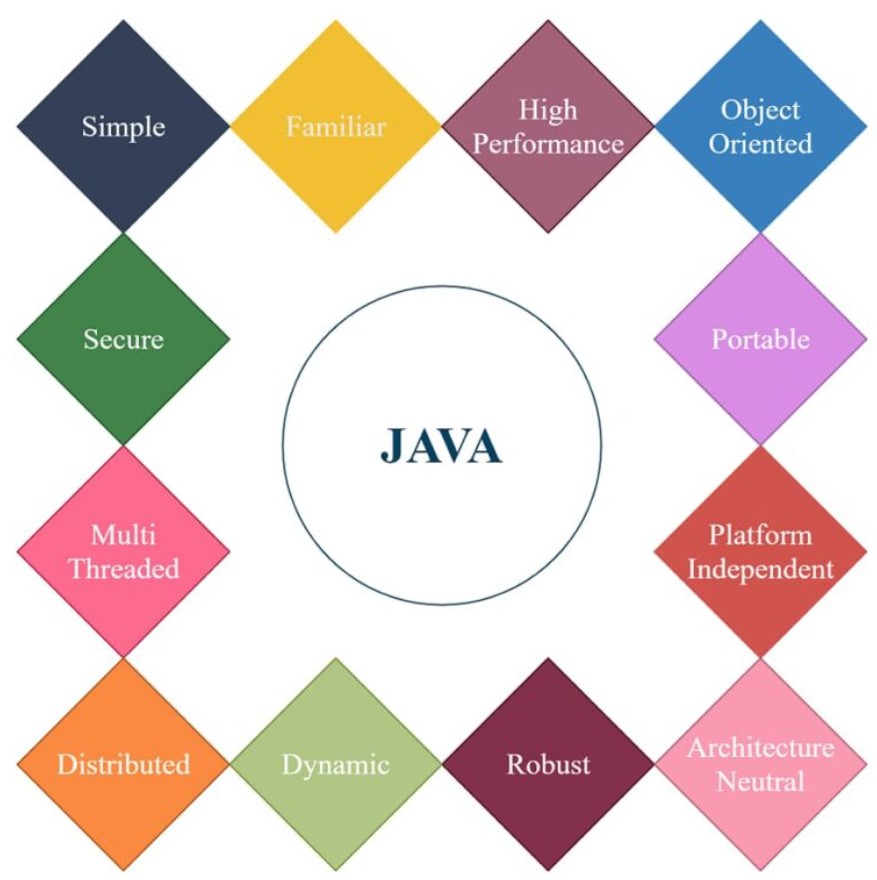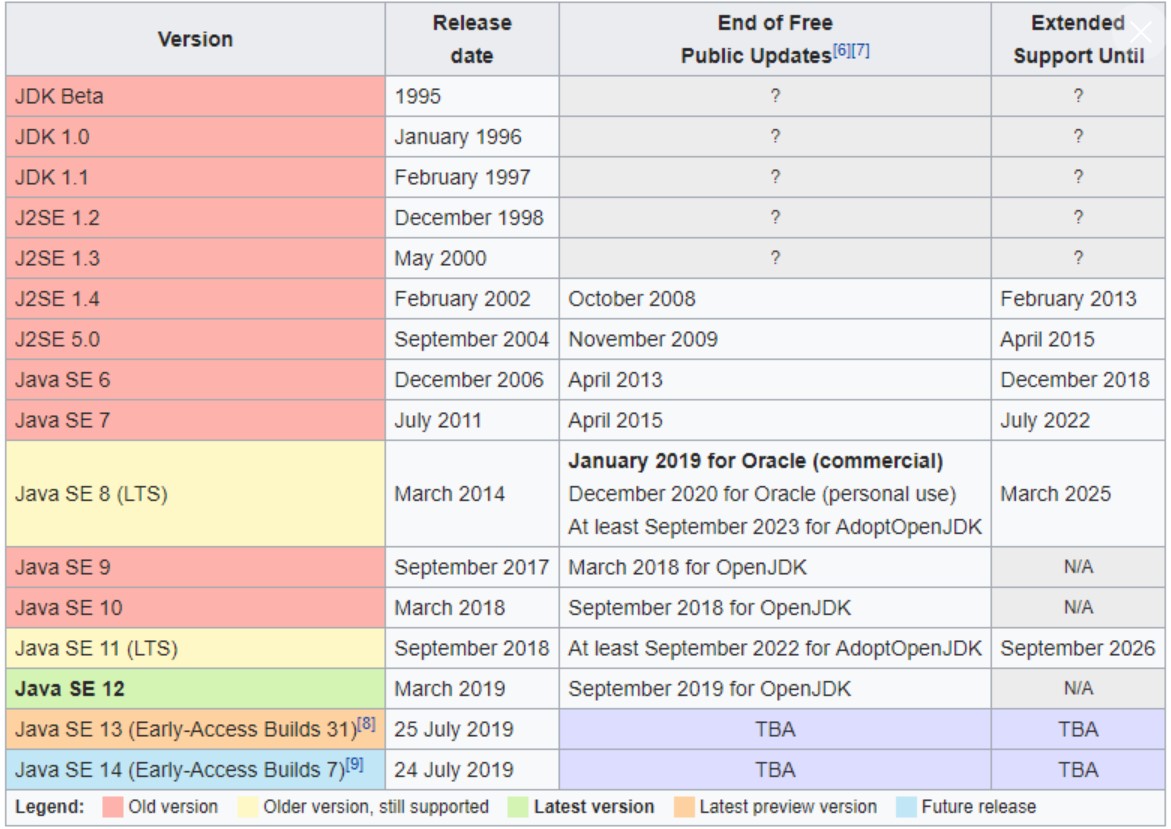Java Tutorial
Java is a general-purpose, class-based, object-oriented programming language designed to have as few implementation dependencies as possible.It is a compiled language, meaning that Java programs are converted into machine code before they are executed.This makes Java programs very efficient and portable.
Java is one of the most popular programming languages in the world, and it is used to develop a wide variety of applications, including web applications, mobile applications, desktop applications, and enterprise software.
Overview of the Java programming language:
1. Platform Independence:
- Java is renowned for its platform independence. It accomplishes this through the use of a Java Virtual Machine (JVM) that translates Java source code into an intermediate bytecode. This bytecode can run on any platform with a compatible JVM, making Java a "Write Once, Run Anywhere" language.
2. Object-Oriented Programming (OOP):
- Java is a pure object-oriented programming language. Everything in Java is an object, and it adheres to OOP principles, such as encapsulation, inheritance, and polymorphism.
3. Simple and Easy to Learn:
- Java was designed to be user-friendly and relatively easy to learn. Its syntax is similar to C and C++, but it eliminates some of the complexities and ambiguities associated with those languages.
4. Rich Standard Library:
- Java provides an extensive standard library (API) that includes classes and methods for a wide range of tasks, including file I/O, networking, data structures, and more. This library simplifies development by offering pre-built components.
5. Robust and Secure:
- Java's strict type checking, exception handling, and automatic memory management contribute to its robustness. It also offers security features such as sandboxing to prevent malicious code from running.
6. Multi-Threading:
- Java has built-in support for multi-threading, making it suitable for developing concurrent and multi-threaded applications. This is essential for tasks such as server programming and user interface development.
7. Performance:
- While Java may not be as fast as low-level languages like C or C++, it offers good performance for most applications. The Just-In-Time (JIT) compiler translates bytecode into native machine code at runtime, improving execution speed.
8. Community and Ecosystem:
- Java boasts a vast and active community of developers and a wealth of third-party libraries and frameworks. It is commonly used for web development (Java EE), desktop applications (Java SE), mobile app development (Android), and big data processing (Hadoop).
9. Integrated Development Environments (IDEs):
- Java is well-supported by powerful integrated development environments (IDEs) such as Eclipse, IntelliJ IDEA, and NetBeans. These IDEs simplify development tasks, including debugging and project management.
10. Modern Versions: - Java has been continually evolving with regular releases. Notable versions include Java 8, which introduced lambdas and the Stream API, Java 11, which provided long-term support (LTS), and subsequent versions with new features and enhancements.
11. Android Development: - Although not directly related to the core Java language, Java is the primary programming language used for developing Android applications, further expanding its reach.
In summary, Java is a versatile, platform-independent, and widely-used programming language known for its simplicity, strong community support, and the ability to develop a wide range of applications, from web and mobile to enterprise-level software.

Key features of Java:
- Platform independence: Java programs can run on any platform that has a Java Virtual Machine (JVM). This means that Java programs can be written once and run anywhere, without the need to be recompiled for each platform.
- Object-oriented: Java is an object-oriented language, which means that programs are organized around objects. Objects are self-contained entities that contain data and code. Object-oriented programming makes it easier to develop and maintain complex software applications.
- Robust: Java is a robust language, which means that it is resistant to errors. Java programs are typically very reliable and stable.
- Secure: Java is a secure language, which means that it is difficult for malicious code to exploit Java programs. Java programs are typically sandboxed, which means that they can only access resources that they are explicitly authorized to access.
Java is a good choice for beginners because it is relatively easy to learn and use. There are also a wealth of resources available to help Java programmers, including tutorials, documentation, and online communities.
Examples of Java applications:
- Web applications: Java is widely used to develop web applications, such as e-commerce websites, social networking sites, and content management systems.
- Mobile applications: Java is also used to develop mobile applications for Android devices.
- Desktop applications: Java can be used to develop desktop applications for Windows, macOS, and Linux.
- Enterprise software: Java is also used to develop enterprise software, such as database management systems, application servers, and ERP systems.

History of Java:
Java was created by James Gosling at Sun Microsystems in the early 1990s. It was originally designed for interactive television, but it was too advanced for the digital cable television industry at the time. The language was initially called Oak after an oak tree that stood outside Gosling's office.
In 1995, Java was released to the public as a core component of Sun Microsystems' Java platform. Java quickly became popular due to its platform independence, object-oriented features, and security.
Java has been used to develop a wide variety of applications over the years, including web applications, mobile applications, desktop applications, and enterprise software. Some of the most popular Java applications include:
- Web applications: Google Chrome, Firefox, Amazon.com, Netflix
- Mobile applications: Android operating system, WhatsApp, Spotify
- Desktop applications: IntelliJ IDEA, Eclipse, LibreOffice
- Enterprise software: Oracle Database, IBM WebSphere, SAP NetWeaver
Java is still one of the most popular programming languages in the world today. It is used by millions of developers to build a wide variety of applications.
key milestones in the history of Java:
- 1991: James Gosling and his team at Sun Microsystems begin developing Java.
- 1995: Java is released to the public as a core component of Sun Microsystems' Java platform.
- 1996: The first version of the Java Development Kit (JDK) is released.
- 1997: Java 1.1 is released, adding new features such as inner classes and reflection.
- 1998: Java 1.2 is released, adding new features such as Swing and JavaServer Pages (JSP).
- 2000: Java 1.3 is released, adding new features such as the Java Collections Framework and Java Native Interface (JNI).
- 2002: Java 1.4 is released, adding new features such as regular expressions and assertions.
- 2004: Java 5.0 is released, adding new features such as generics and enhanced for-loops.
- 2006: Java 6.0 is released, adding new features such as scripting support and concurrent collections.
- 2010: Java 7.0 is released, adding new features such as closures, try-with-resources, and strings in switch statements.
- 2011: Oracle acquires Sun Microsystems.
- 2014: Java 8.0 is released, adding new features such as lambda expressions, streams, and the Date and Time API.
- 2017: Java 9.0 is released, adding new features such as modules and the Stream API improvements.
- 2018: Java 10.0 is released, adding new features such as the var keyword and local-variable type inference.
- 2018: Java 11.0 is released, adding new features such as the HttpClient API and the Stream API improvements.
- 2019: Java 12.0 is released, adding new features such as the Switch Expressions and the Stream API improvements.
- 2020: Java 13.0 is released, adding new features such as the Text Blocks and the Stream API improvements.
- 2021: Java 16.0 is released, adding new features such as the Sealed Types and the Stream API improvements.
- 2022: Java 17.0 is released, adding new features such as the Pattern Matching for instanceof (Preview) and the Stream API improvements.
Java is a constantly evolving language, and new features are added with each release. Java is a good choice for developers who want to build reliable, secure, and portable applications.

Enroll Now
- Java Programming
- Machine Learning